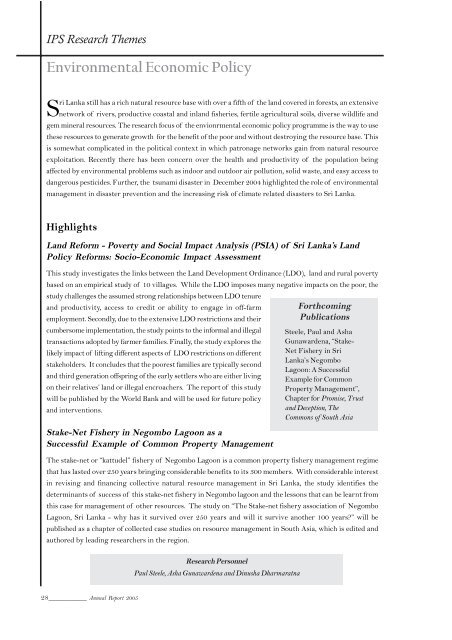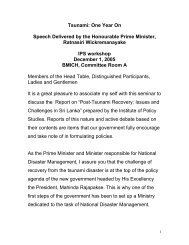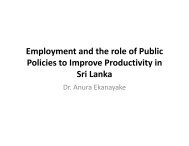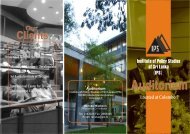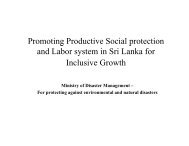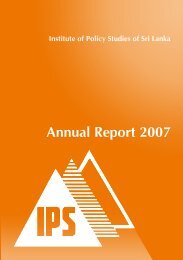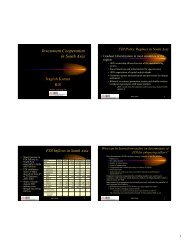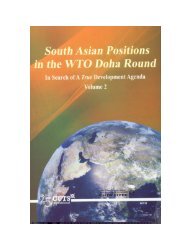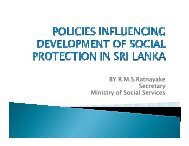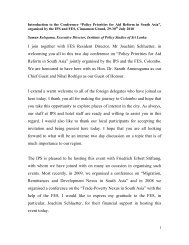Annual Report 2005 - Institute of Policy Studies of Sri Lanka
Annual Report 2005 - Institute of Policy Studies of Sri Lanka
Annual Report 2005 - Institute of Policy Studies of Sri Lanka
- No tags were found...
Create successful ePaper yourself
Turn your PDF publications into a flip-book with our unique Google optimized e-Paper software.
IPS Research ThemesEnvironmental Economic <strong>Policy</strong><strong>Sri</strong> <strong>Lanka</strong> still has a rich natural resource base with over a fifth <strong>of</strong> the land covered in forests, an extensivenetwork <strong>of</strong> rivers, productive coastal and inland fisheries, fertile agricultural soils, diverse wildlife andgem mineral resources. The research focus <strong>of</strong> the envionrmental economic policy programme is the way to usethese resources to generate growth for the benefit <strong>of</strong> the poor and without destroying the resource base. Thisis somewhat complicated in the political context in which patronage networks gain from natural resourceexploitation. Recently there has been concern over the health and productivity <strong>of</strong> the population beingaffected by environmental problems such as indoor and outdoor air pollution, solid waste, and easy access todangerous pesticides. Further, the tsunami disaster in December 2004 highlighted the role <strong>of</strong> environmentalmanagement in disaster prevention and the increasing risk <strong>of</strong> climate related disasters to <strong>Sri</strong> <strong>Lanka</strong>.HighlightsLand Reform - Poverty and Social Impact Analysis (PSIA) <strong>of</strong> <strong>Sri</strong> <strong>Lanka</strong>’s Land<strong>Policy</strong> Reforms: Socio-Economic Impact AssessmentThis study investigates the links between the Land Development Ordinance (LDO), land and rural povertybased on an empirical study <strong>of</strong> 10 villages. While the LDO imposes many negative impacts on the poor, thestudy challenges the assumed strong relationships between LDO tenureand productivity, access to credit or ability to engage in <strong>of</strong>f-farm Forthcomingemployment. Secondly, due to the extensive LDO restrictions and their Publicationscumbersome implementation, the study points to the informal and illegal Steele, Paul and Ashatransactions adopted by farmer families. Finally, the study explores the Gunawardena, “Stakelikelyimpact <strong>of</strong> lifting different aspects <strong>of</strong> LDO restrictions on different Net Fishery in <strong>Sri</strong><strong>Lanka</strong>’s Negombostakeholders. It concludes that the poorest families are typically secondLagoon: A Successfuland third generation <strong>of</strong>fspring <strong>of</strong> the early settlers who are either livingExample for Commonon their relatives’ land or illegal encroachers. The report <strong>of</strong> this study Property Management”,will be published by the World Bank and will be used for future policy Chapter for Promise, Trustand interventions.and Deception, TheCommons <strong>of</strong> South AsiaStake-Net Fishery in Negombo Lagoon as aSuccessful Example <strong>of</strong> Common Property ManagementThe stake-net or “kattudel” fishery <strong>of</strong> Negombo Lagoon is a common property fishery management regimethat has lasted over 250 years bringing considerable benefits to its 300 members. With considerable interestin revising and financing collective natural resource management in <strong>Sri</strong> <strong>Lanka</strong>, the study identifies thedeterminants <strong>of</strong> success <strong>of</strong> this stake-net fishery in Negombo lagoon and the lessons that can be learnt fromthis case for management <strong>of</strong> other resources. The study on “The Stake-net fishery association <strong>of</strong> NegomboLagoon, <strong>Sri</strong> <strong>Lanka</strong> - why has it survived over 250 years and will it survive another 100 years?” will bepublished as a chapter <strong>of</strong> collected case studies on resource management in South Asia, which is edited andauthored by leading researchers in the region.Research PersonnelPaul Steele, Asha Gunawardena and Dinusha Dharmaratna28__________ <strong>Annual</strong> <strong>Report</strong> <strong>2005</strong>


